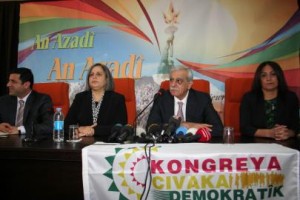 AMED, — Democratic Society Congress (DTK) and Peace and Democracy Party (BDP) held a press conference on Newroz celebrations and the government’s new strategy.
AMED, — Democratic Society Congress (DTK) and Peace and Democracy Party (BDP) held a press conference on Newroz celebrations and the government’s new strategy.
DTK co-chair Ehmed Turk said that Kurdish people have shown their desire to establish their own free future as BDP Co-Chair Gulten Kişanak noted, “We cannot negotiate with a government mentality based on the oppression of people by security forces.”
DTK Co-Chair Aysel Tugluk pointed out; “Intermediary solutions and formulas have come to an end with Newroz. None of us will accept a solution that will not include [Kurdistan Workers’ Party/PKK leader] Mr. Ocalan,” as BDP Co-Chair Selahattin Demirtaş said that the Kurdish people showed that they will not give up the struggle for the freedom of Ocalan.
Ehmed Turk and Gulten Kişanak emphasized in their speech that the Kurdish issue must be solved by establishing a dialogue with those that the Kurdish people accept as their leader and representative. “Millions of Kurds want freedom for Ocalan, you cannot deceive people with fake solutions,” said Turk as Gulten Kişanak criticized the government for harassing BDP deputies instead of negotiating with them.
“Either a negotiation process will be started and the issue will be solved on a basis of equality and freedom or the violence will increase. The government has to decide at this point. We have done enough to show our good intentions. After this point, the responsibility lies with the government. The first actor to establish a dialogue with is Mr. Ocalan. The Kurds’ demands are clear,” said Aysel Tugluk.
Selahattin Demirtaş noted that the Kurds showed their determination for autonomy and freedom for Ocalan. Demirtaş listed propositions for the solution of the Kurdish issue as the ending of all military and political operations as well as the isolation of Ocalan, the preparation of a free and appropriate basis for negotiations, the release of all political prisoners, the establishment of a peace council by politicians and non-governmental organizations, the suppression of specially authorized courts and the establishment of freedom of press and expression.